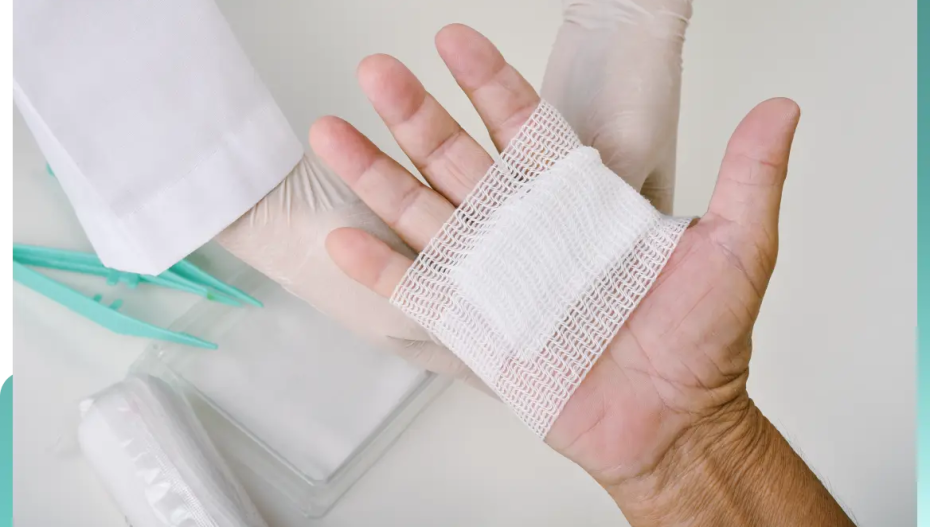Understanding how to properly treat wounds and lacerations at home is essential for preventing infection and promoting healing. Moreover, it is crucial to recognise when professional medical care is needed.
A laceration is a wound that occurs when your skin, muscles, and/or tissues are torn or cut open. These injuries can vary in length, depth, and width. Lacerations typically happen when the skin comes into contact with an object or an object that impacts the skin with force. Such injuries are common and often not too serious, but it is crucial to know how to treat them properly and recognise when medical attention is necessary. Read on to learn how to manage lacerations at home and identify when to seek professional medical care.
How to Treat Lacerations at Home?
For wounds and lacerations, it is essential to clean the wound thoroughly to prevent infection. Here is the first-aid treatment for wounds and lacerations:
- Wash Hands: Before applying any first aid to an open wound, wash your hands thoroughly to keep the wound clean and prevent infection.
- Stop the Bleeding: The next critical step is to stop the bleeding. For deep wounds like lacerations, stopping the haemorrhage is crucial to prevent hypovolemic shock, which can be fatal. Apply gentle pressure with a clean cloth or bandage and elevate the wound until the bleeding stops.
- Clean the Wound or Laceration: Once the bleeding has stopped, rinse the wound with clean water for about five minutes to remove dirt and debris. Use soap and water to clean the wound further.
- Disinfect: Apply a topical antiseptic, like Cipladine ointment, to prevent infection. Cipladine is a potent disinfectant and antiseptic, effectively treating and preventing skin infections in lacerations, cuts, burns, and abrasions.
- Dress the Wound: Cover the wound with a sterile gauze pad and secure it with adhesive tape. For minor scrapes or abrasions, you can leave the wound uncovered.
- Change the Covering: Replace the dressing at least once a day or whenever it becomes wet or dirty.
Clinical Treatment for Wounds and Lacerations
Some wounds may require medical treatment to ensure proper healing and to prevent infection. For pain relief, you can take over-the-counter medications such as ibuprofen and paracetamol. Consult your doctor or pharmacist for advice on the best medication for your situation.
If you have a gaping wound, then a doctor may need to close it with:
- Staples
- Sutures (stitches)
- Special dressings
- Special glue
These measures will help your wound heal properly.
Additionally, you should see a doctor or a nurse for a tetanus immunisation within a day if you have a cut or abrasion and any of the following apply:
- You have had fewer than 3 tetanus immunisations in your life or you are unsure how many you have had.
- It has been over 10 years since your last tetanus shot or you can’t remember when you last had one.
- It has been over 5 years since your last tetanus shot and your wound is deep.
When to See a Doctor?
Minor wounds and lacerations typically don’t need medical attention. However, you should see a doctor within six hours if your wound:
- Doesn’t stop bleeding
- Is dirty or occurred in dirty water
- Is on your eyelid or near your eye
- Is very painful
- Is from a bite, whether by an animal or another human
- Is over a joint, like your knuckle or knee
- If you are unsure about your tetanus shot status
Additionally, you should consult a doctor if the wound:
- Is gaping, meaning the sides do not come together well
- Is more than a few millimetres deep
These types of wounds may need to be closed with tissue glue, stitches, or staples.
When to Seek Urgent Medical Attention?
If your wound is deep, you should see a doctor within two hours. Seek urgent care if:
- The wound is in your eye
- You feel faint, have chest pain, or are short of breath
- The wound doesn’t stop bleeding when you apply pressure
- You are taking blood-thinning medications
Properly treating wounds and lacerations is crucial for preventing infection and promoting healing. While many minor injuries can be managed at home with thorough cleaning, stopping the bleeding, and applying antiseptic such as Cipladine ointment, it is essential to recognise when professional medical care is needed.













